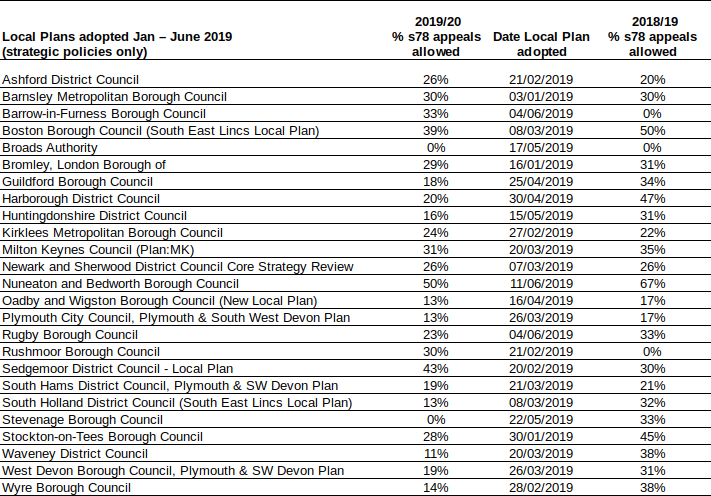Do up-to-date Local Plans reduce appeal success rates
Local planning authorities are urged by the Government to have an up-to-date Local Plan with one of the benefits cited as reducing the likelihood of a LPA’s decisions being overturned at appeal. We decided put this to the test.
Evidence of impact of Local Plans on planning appeals
Appeal Finder looked at Local Plans that have been recently adopted to see whether there was a noticeable difference in appeal success rates for LPAs that have recently adopted a Local Plan.
Statistics for each LPA are only available for 12 months ending 31st March so the test works best where Local Plans were adopted around this date. We therefore looked at Local Plans that were adopted 3 months either side, namely January - June 2019, and compared their LPAs appeal success rates for the financial year 2019/20 compared with the previous year 2018/19.

Analysis of Local Plan adoption on appeal success rates
In the majority of cases, adoption of a Local Plan reduces the number of appeals allowed. 17 of the 25 LPAs who adopted a strategic Local Plan over the six months January – June 2019 saw reductions in their rate of appeals allowed.
Three LPAs saw no change (Barnsley, the Broads and Newark & Sherwood). Five saw an increase. In three of these cases it was due to a small number of appeals in the year before the Local Plan was adopted (Ashford and Barrow-in-Furness had only 1 appeal each in 2018/19 while Rushmoor had only 3 appeals) so the figures for these LPAs are not statistically significant. Only Kirkless and Sedgemoor bucked the overall trend with increases in the number of appeals overturned.
Other reasons for changing appeal success rates over time
Local Plan progress is not the only factor that influence planning appeal success rates. Others are:
- a change in the LPA’s five year housing land supply position, for example based on a higher or lower housing requirement in the Local Plan and more land supply through allocations;
- change in a LPA’s behaviour based on feedback from winning or losing previous appeals;
- changing staff and councillors in a LPA;
- planning Inspectors individual working styles and PINS guidance;
- statistical variance or a small number of appeals.
Local Plan progress for all LPAs in England
For Local Plan progress from June 2020 onwards please see table 1.2 on the PINS website.
To find appeals that are relevant to you, use the search on our Home page.

